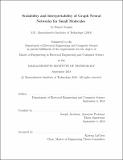Scalability and interpretability of graph neural networks for small molecules
Author(s)
Sangha, Manjot.
Download1098180075-MIT.pdf (762.2Kb)
Other Contributors
Massachusetts Institute of Technology. Department of Electrical Engineering and Computer Science.
Advisor
Joseph Jacobson.
Terms of use
Metadata
Show full item recordAbstract
In this thesis I examine the use of graph neural networks for prediction tasks in chemistry with an emphasis on interpretable and scalable methods. I propose a novel kernel-inspired graph neural network architecture, called a subgraph matching neural network (SMNN), which is designed to have all feature representations and weights be human interpretable. I show that this network can achieve competitive performance with common graph neural network baselines. I also show that the network is capable of learning features that allow for transfer learning to larger molecules with significantly better performance than some baselines. This provides evidence the network is learning chemically useful representations. I then propose a framework for defining graph pooling operations to improve the scalability of graph neural networks with molecule size. I empirically examine some examples of these graph pooling layers and show that they can provide a significant speed-up without hurting accuracy, and even improving accuracy in some cases. Finally an instance of the SMNN network with a pooling layer is shown to achieve state-of-the-art accuracy on the Harvard Clean Energy Project dataset.
Description
This electronic version was submitted by the student author. The certified thesis is available in the Institute Archives and Special Collections. Thesis: M. Eng., Massachusetts Institute of Technology, Department of Electrical Engineering and Computer Science, 2018 Cataloged from student-submitted PDF version of thesis. Includes bibliographical references (pages 95-98).
Date issued
2018Department
Massachusetts Institute of Technology. Department of Electrical Engineering and Computer SciencePublisher
Massachusetts Institute of Technology
Keywords
Electrical Engineering and Computer Science.